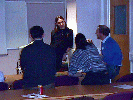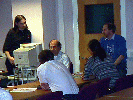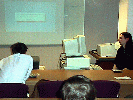Content is scrollable
Manlug meeting March 1998
21st March 1998
Saturday, 21 March 1998, From 14:00 GMT
Manchester Computing Building
Oxford Road,
Manchester
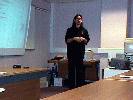 Tim Shuttleworth of Manchester Computing (Networking and Operations) gave a survey of FreeBSD and variants. FreeBSD runs only on PCs at present though there are thoughts of an Alpha port. NetBSD runs "on practically anything". OpenBSD runs on a variety of hardware and emphasises security aspects.
Tim Shuttleworth of Manchester Computing (Networking and Operations) gave a survey of FreeBSD and variants. FreeBSD runs only on PCs at present though there are thoughts of an Alpha port. NetBSD runs "on practically anything". OpenBSD runs on a variety of hardware and emphasises security aspects.
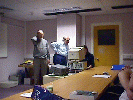 One big contrast between Linux and FreeBSD is the unified central development of FreeBSD. As a result you know what FreeBSD is at any time: it is what's on the FreeBSD ftp site. It is (of course) free, derived from BSD-lite, fully featured, easily installed and maintained, binary compatible with BSD/OS, SCO Unix and Linux.
One big contrast between Linux and FreeBSD is the unified central development of FreeBSD. As a result you know what FreeBSD is at any time: it is what's on the FreeBSD ftp site. It is (of course) free, derived from BSD-lite, fully featured, easily installed and maintained, binary compatible with BSD/OS, SCO Unix and Linux.
Tim described its development from 3868BSD in 1992 through the release of FreeBSD in 1993 to OpenBSD (1996) and described in some detail the differences with NetBSD and OpenBSD, and the hardware requirements. It can be installed from CDROM, ftp (several sites, which also carry extensive documentation), alien (=DOS) or NFS filesystem, tape or even floppies.
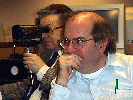 There are many major users of FreeBSD, ranging from Yahoo through Sony to Machester Computing (and the Unincorporated Society of Plastic Sheep was not forgotten).
There are many major users of FreeBSD, ranging from Yahoo through Sony to Machester Computing (and the Unincorporated Society of Plastic Sheep was not forgotten).
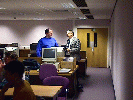 The talk ended with a demonstration of ftp-installation of FreeBSD onto the Debian Linux machine that Tim had been using to generate his OHP displays: this encountered some obscure difficulties and at one point the screen displayed "Windows 95" ...
The talk ended with a demonstration of ftp-installation of FreeBSD onto the Debian Linux machine that Tim had been using to generate his OHP displays: this encountered some obscure difficulties and at one point the screen displayed "Windows 95" ...
The talk was very well presented. Tim described how he had been "dropped into" using FreeBSD for Manchester Computing work (there are now several FreeBSD servers supporting major aspects of the service), and now relies on it. No doubt his confidence in the system was reflected in the assurance with which he described it.
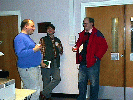 As might be expected, an audience of Linux users had some questions to ask to an advocate of the rival camp. Major issues discussed were comparisons between applications, and differences in consistency, stability, unity and ease of installation and undating. FreeBSD has a good reputation for its networking performance, and perhaps Linux came slightly less well out of this comparison.
As might be expected, an audience of Linux users had some questions to ask to an advocate of the rival camp. Major issues discussed were comparisons between applications, and differences in consistency, stability, unity and ease of installation and undating. FreeBSD has a good reputation for its networking performance, and perhaps Linux came slightly less well out of this comparison.
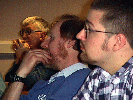 By this time people were beginning to move around and form small groups, one of which huddled round Tim and his machine. Discussion then became very informal. In due course, a number of us adjourned to the Sanam Indian restaurant to round off the day.
By this time people were beginning to move around and form small groups, one of which huddled round Tim and his machine. Discussion then became very informal. In due course, a number of us adjourned to the Sanam Indian restaurant to round off the day.
32 people attended, some from good distances. Alec Clews from London, representing the UK UNIX Users Group (SIG of the British Computing Society) took the opportunity to announce that the UKUUG will organise a meeting in Manchester in late June of which the theme will be -- Linux. (Details of this meeting will be announced in full later).
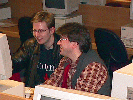 Several photographs (digital, of course) were taken which will shortly be available on the ManLUG Web Site along with this report of the meeting.
Several photographs (digital, of course) were taken which will shortly be available on the ManLUG Web Site along with this report of the meeting.
Best wishes to all, and hearty thanks to all who turned out to help make a success of an interesting and enjoyable meeting.
Tim's slides, which give many useful URLs, are available here.
Ted
